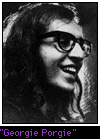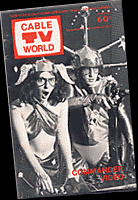

 Contending that his Beatles cut was integral to his rock 'n' roll persona and therefore his livelihood--and that barring a student over hair length was simply unreasonable--Mr. Leonard and his parents sued to overturn the suspension.
Contending that his Beatles cut was integral to his rock 'n' roll persona and therefore his livelihood--and that barring a student over hair length was simply unreasonable--Mr. Leonard and his parents sued to overturn the suspension.
 After kicking around with other bands, he came back to New York to put together "The Commander Video Show" in 1978. The show starred Mr. Leonard, who pogo-sticked in front of the Metropolitan Museum of Art, sang a love song to a fish, hawked T-shirts and engaged in twisted, sophomoric skits. Mr. Leonard talks about the show with a mixture of amusement and embarrassment. Commander Video's monologues were "usually awful"; his adventures were "not really subversive, just ignorant."
After kicking around with other bands, he came back to New York to put together "The Commander Video Show" in 1978. The show starred Mr. Leonard, who pogo-sticked in front of the Metropolitan Museum of Art, sang a love song to a fish, hawked T-shirts and engaged in twisted, sophomoric skits. Mr. Leonard talks about the show with a mixture of amusement and embarrassment. Commander Video's monologues were "usually awful"; his adventures were "not really subversive, just ignorant."
| Home | Gigs | Press | About Elvis | MP3 Lounge | Lyrics | Buy Elvis Stuff |